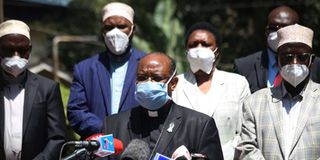Government extends Inter-Faith council's term by 6 months
Interior Cabinet Secretary Fred Matiang'i addressing journalists at Serena Hotel in Nairobi on June 21, 2021 after meeting members of the Inter-Faith Council for National Response to Coronavirus Pandemic.
What you need to know:
- The council comprises religious entities including the Anglican Church of Kenya (ACK), Supreme Council of Kenya Muslims (Supkem), Presbyterian Church of East Africa (PCEA) and the Hindu Council of Kenya.
The government will extend the term of the Inter-Faith Council on the national response to Covid-19 by six months, Interior Cabinet Secretary Fred Matiang’í announced Monday.
The 15-member council, chaired by Nyeri Catholic Archbishop Anthony Muheria, has been in office since June 12 last year when a Gazette notice jointly signed by the CS Matiangí and his health counterpart Mutahi Kagwe appointed it to respond to the coronavirus pandemic.
The council comprises religious entities including the Anglican Church of Kenya (ACK), Supreme Council of Kenya Muslims (Supkem), Presbyterian Church of East Africa (PCEA) and the Hindu Council of Kenya.
It is tasked with developing protocols for resumption of religious activities during the pandemic and offering guidance on phased re-opening of places of worship.
It is also tasked with guiding religious activities such as weddings and burials and ensuring adherence to anti-Covid-19 rules such as social distancing, as well as making sure all religious leaders are sensitised on the protocols.

Interfaith Council chair, Archbishop Anthony Muheria, addresses the media accompanied by other church leaders, on measures to contain the Covid-19 pandemic, at Ufungamano House in Nairobi on September 29, 2020.
Mandate
The mandate of the council, that is only answerable to President Uhuru Kenyatta through the National and County Government Coordinating Summit, lapsed on December 31, 2020 but was extended “at the discretion of the President”.
With its second extension announced Monday, the council is expected to operate until December 2021 as the pandemic persists.
“There are many occasions that will still require us to collaborate with the IFC , including in the distribution of vaccines. At the moment, what we are focused on is making sure we do not lose more lives to this disease by making sure we all comply [with guidelines] and that where there are challenges, we consult one another,” said CS Matiang'í.
Hot zones
At the moment, 13 counties - Busia, Vihiga, Kisii, Nyamira, Kakamega, Kericho, Bomet, Bungoma, Trans Nzoia, Kisumu, Siaya, Homa Bay and Migori - have been declared Covid-19 hot zones.
Religious gatherings in these counties have been banned.
The CS noted, however, that the government is keen on ensuring worship continues in the 13 counties.
"We are going to relook at these measures under the guidance of the Ministry of Health to see how fast we can resume worship in the 13 counties, even as we observe measures issued to secure the lives of our people," he said.
The CS also urged security agencies harassing religious leaders to treat them respectfully.
“Many of our religious leaders are very respectful of the government so I ask all chiefs, assistant chiefs, ACCs and DCCs across the country to build stronger and collaborative relations with our religious leader, and accord them the respect and support they need as they meet our spiritual needs,” the CS said.
“These are tough times. Let us not make things worse by being abrasive in the manner in which we deal with people.”





